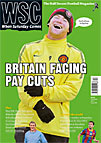 James McMahon questions why there are no openly gay footballers
James McMahon questions why there are no openly gay footballers
It’s now just over 20 years since Justin Fashanu, Britain’s first and, to date, only openly gay footballer, agreed a deal with the Sun to come out. Last year, the PR kingpin Max Clifford teased the press by stating he’d recently advised two high-profile Premier League stars not to follow in Fashanu’s footsteps, adding that football “remains in the dark ages, steeped in homophobia”.
In the run-up to the anniversary, the question of why no one has followed Fashanu’s example was asked more than it had been in a while. It was asked when the prolifically capped Welsh rugby player Gareth Thomas came out last December. Then Fashanu’s name came into circulation once more when the FA cancelled the promotion of its widely discussed and hard-hitting anti-homophobia video in February.
The video featured an office worker seen shouting homophobic insults, first in co-workers’ faces, then on the terraces. Out British former NBA basketball player John Amaechi disapproved of the language used and gay rights activist Peter Tatchell said it was “not what he’d hoped for”. The campaign was rumoured to have been cancelled because no high-profile player would come forward to support it. Regardless, the feeling among the gay community was that the football authorities were out of step with them. Seemingly to confirm this, upon withdrawing the video, the FA announced it had “decided to take more time to strengthen our strategy in this area of work”.
It’s rare to praise Clifford for an astute turn of phrase, but it’s difficult to disagree with his assessment that football remains entrenched in outdated thinking. There’s a feeling that the game doesn’t necessarily hate homosexuality, it just doesn’t understand it – two years ago, Fashanu’s former agent Eric Hall even claimed to BBC Nottingham that “[gay people] aren’t attracted to football”.
It’s been refreshing to have less talk about racism in football in recent years, yet many fans would agree that the game remains populated by men with wearily regressive views. Many of these, like Levski Sofia president Todor Batkov – who famously described referee Mike Riley as a “British homosexual” after a UEFA Cup game in 2006 – maintain an almost irreverent form of idiocy, a little like the “poof” baiting Brian Clough tormented Fashanu with during the striker’s miserable years at Nottingham Forest.
Anti-gay prejudice is occasionally addressed in the mainstream football press – the Daily Mirror’s John Cross, for example, describes homophobia within football as “abhorrent” and calls upon the FA and club officials to “crack down firmer on what’s sung and chanted within grounds”. But there was little condemnation from the giggling press throng when Diego Maradona announced at the World Cup that he wasn’t “limp wristed” for displaying affection with his players – as if that was something that was acceptable to say in public, let alone on TV.
Maradona’s utterance seemed particularly distasteful given the case of Eudy Simelane, a former midfielder for Springs Home Sweepers and a fixture of South Africa’s women’s team. Simelane was openly lesbian and had died just two years before in KwaThema, a victim of “corrective rape”, where men sought to “cure” her sexuality by raping and then murdering her. Much was written in the press about South African football this summer but I didn’t read the name Simelane once.
Fashanu’s story generates statistics about ratio, about how a sport with over half a million professional players can claim only one out gay player. Yet given the sole case study to date ended with the player taking his own life in a Shoreditch garage 12 years ago, the answer to that question isn’t too complex. In light of what happened in the eight years that followed from October 22, 1990, it’s hard not to empathise with other gay men and women within the game who might not be convinced of the argument for coming out.
Clifford goes on to say that it is unlikely a Premier League star will come out in the near future. He believes that if they do, they are likely to be an established, experienced star with a career behind them and little to lose. Ben Summerskill, the chief executive of the gay rights charity Stonewall, disagrees, telling the Guardian this year he would be surprised if there wasn’t an heir to the pioneering Fashanu within the decade. Nevertheless, the feeling remains that few will follow the striker’s lead, until football finally understands what being gay actually is.
From WSC 286 December 2010